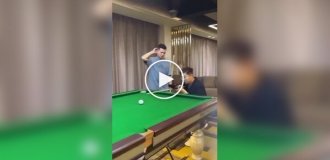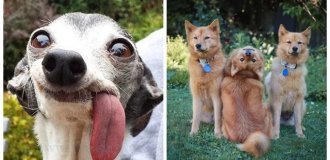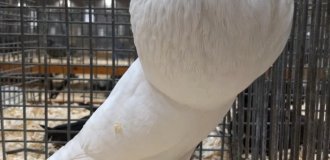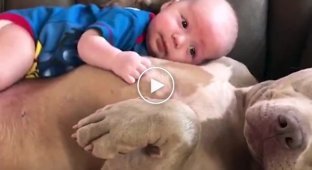To the uninitiated, all this chaos—the snapping of teeth in your face and vicious growls—might actually seem like the start of a fight. But it's not! For dogs, biting their faces is akin to a dialogue. And today we'll learn dog language! 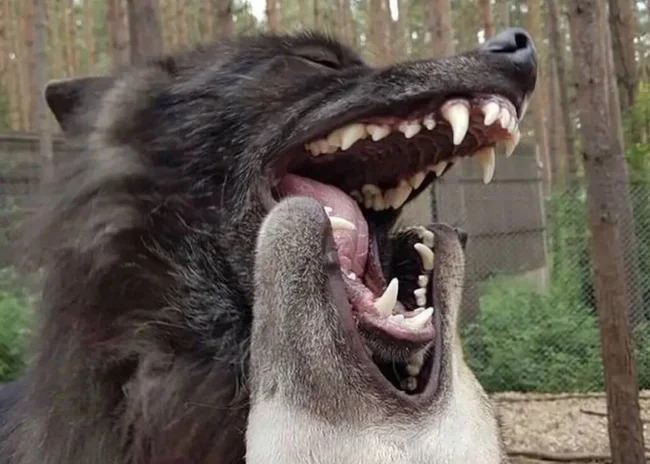
And wolves, by the way! The communication between these two species is very similar. The only difference is that adult dogs often act like silly teenagers and are much more goofy.
Puppies begin biting each other's faces as soon as they open their eyes, around 3-4 weeks. Their vision is still poor at this time, so they bite everything in sight. Someone's face, a paw, their mother's ear, a blanket, a human hand—it doesn't matter. There's no real communication yet; the puppies are simply exploring their new world. 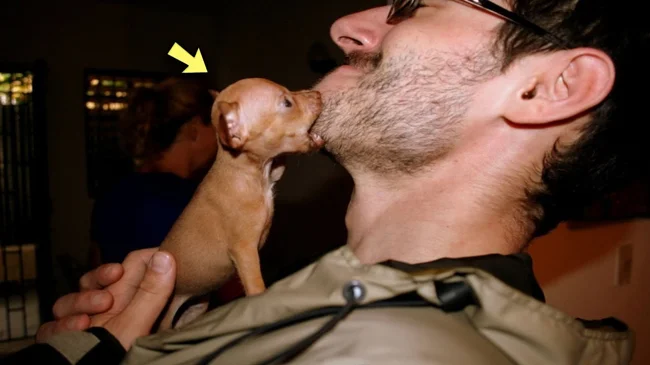
Caution! Keep children away from the screen! Horrible footage of a fighting Chihuahua attacking a person!
A little later, the biting becomes more deliberate as the puppies begin their first attempts at communication. By biting each other on the muzzle and other body parts, they invite each other to play. But they can't yet control the force of their bites, so one of them inevitably starts squealing pitifully. Their teeth are like needles! It's especially fun to wake up first and gnaw on your siblings. However, they might bite you back. These are the first phrases: "Let's play!", "It hurts!", "Stop!" 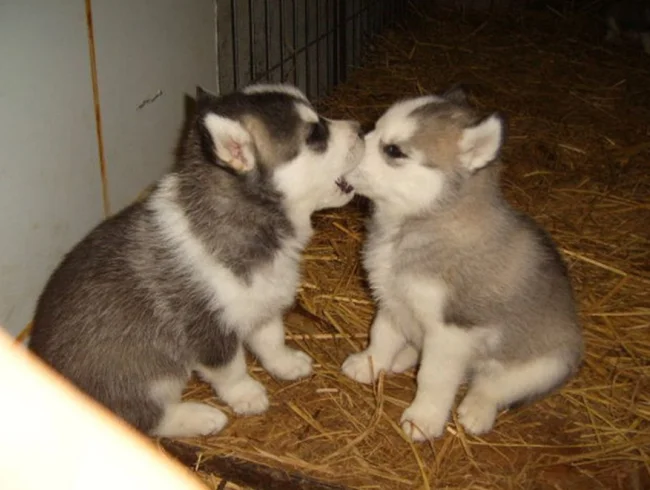
Stolen your nose!
By 6-7 weeks, the mother appears in the babies' play. Now she's not just a milk bar, but also a playmate! In a fit of joy, the puppies nip at her where they used to—her nipples. Their mother doesn't tolerate such mischief—after all, the puppies now have teeth. Dogs don't read books on child psychology; they're not afraid of psychologically traumatizing their puppies. Therefore, if the kids drive their mother to the brink of anger, she'll begin to growl angrily and bite her muzzle. This is the first lesson in communication from an adult dog: "Enough!", "Calm down!", "I'm older and stronger, you can't treat me like that!" 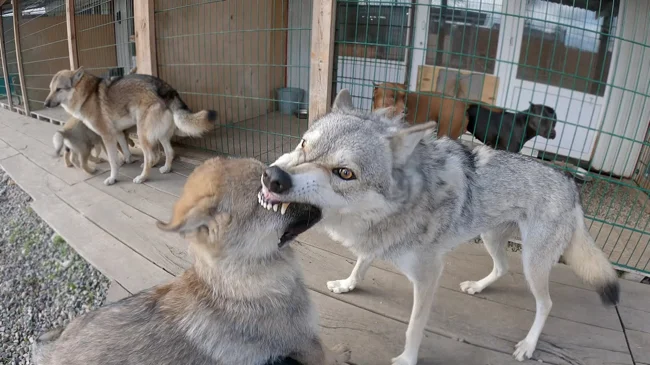
A typical mother of three little angels.
At such moments, the puppies squeal loudly, as if their mother had already mauled them to death. But, of course, she means them no harm. They squeal in fear. But after such a lesson, the cheeky little ones immediately turn into submissive little ones—they fall on their backs and show their bellies to their mother. And when she calms down, they approach her half-bent and stick their muzzles into her mouth. This means, "We understand!", "Don't be angry!", "We accept your leadership!" 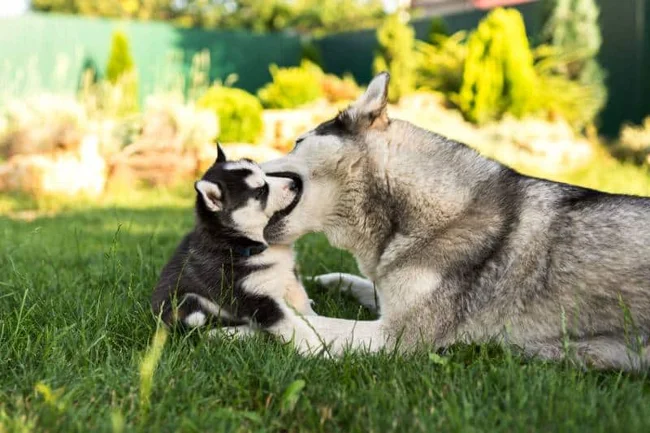
Sometimes at such moments, the mother may bite the puppy's muzzle again, but this time lovingly. She can't kiss him!
By two months, face biting reaches a new level of communication. The puppies have almost completely transitioned to adult food, but are still unable to obtain it themselves. Despite the fact that they are regularly and generously fed in the kennel, the puppies' instincts still reflect the begging behavior of adult dogs. They first learn to demand food from their mother. As soon as the puppies sense that she has eaten something (even something unappetizing), they immediately run over and start licking and nibbling her face: "We're hungry!", "Share your spoils!", "We're small and defenseless!" In response to such statements, any mother's heart would tremble—and the mother dog regurgitates the freshly eaten goodness to her puppies. 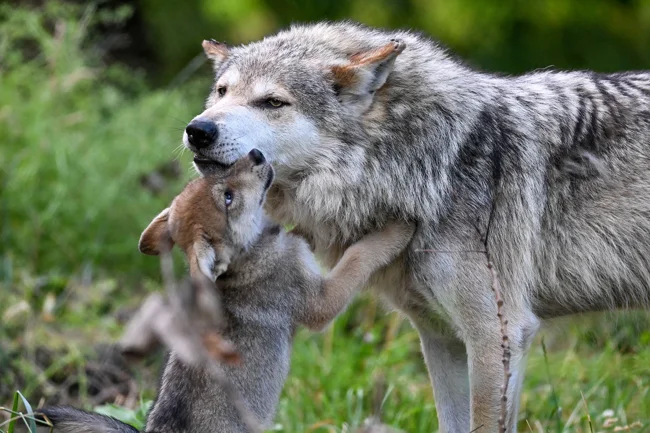
This is me at age 9, meeting my mom at the store and waiting to see what treats she'll pull out of the bag.
Later, when puppies begin to regularly interact with other adult dogs and become part of a pack, the "begging" behavior changes its meaning. Now the little ones lick and bite other dogs' faces not only to ask for food but also to gain their approval and favor: "Look how small and cute we are!", "Don't hurt us, we're still kids!" Licking a puppy's face is a typical childish gesture, intended to calm an adult dog and smooth things over if a puppy has messed up. The older dog may respond by nipping the puppy's face with the message, "I understand and accept you." 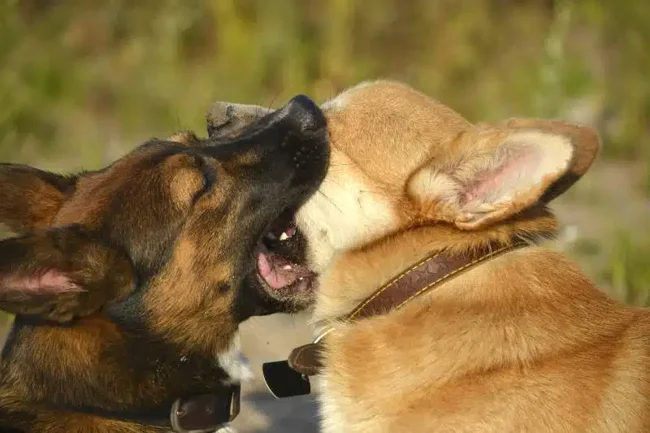
That same teenage couple in the back row of the movie theater.
As puppies mature, they occupy a specific place in the pack hierarchy. Insecure and weak puppies continue to display puppyish behavior even as adults. For example, during conflict situations, to end the argument immediately, they present their muzzle, as if to say, "You're in charge, calm down!" or "There's no reason to be angry, I obey!" Dominant puppies may bite the presented muzzle and even growl, but this is just for show; in reality, such bites never cause harm. 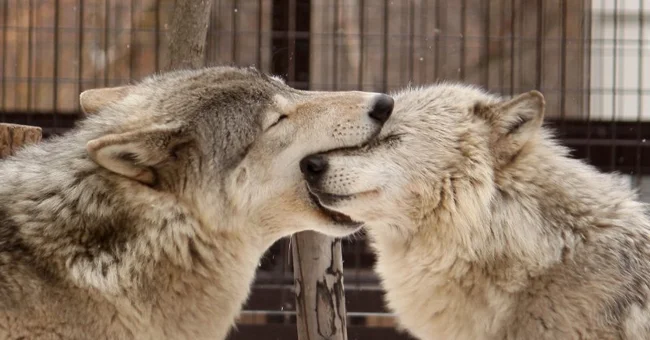
Honey, let's stop our argument and just be quiet!
And sometimes, muzzle bites don't have any real meaning. Dogs just enjoy playing this way: opening their mouths, baring their teeth, growling, and gently biting each other on the bread slicer—a kind of oral sparring. It's like men in a group of friends starting a mock wrestling match. It looks creepy, but there's nothing to be afraid of. The dogs are just having fun and releasing excess tension; no one will bite off anyone's nose. 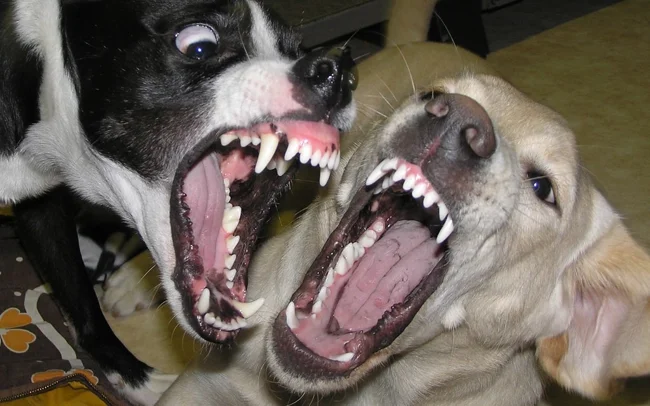
Not a game—it's a dentist's dream.
Add your comment
You might be interested in:
